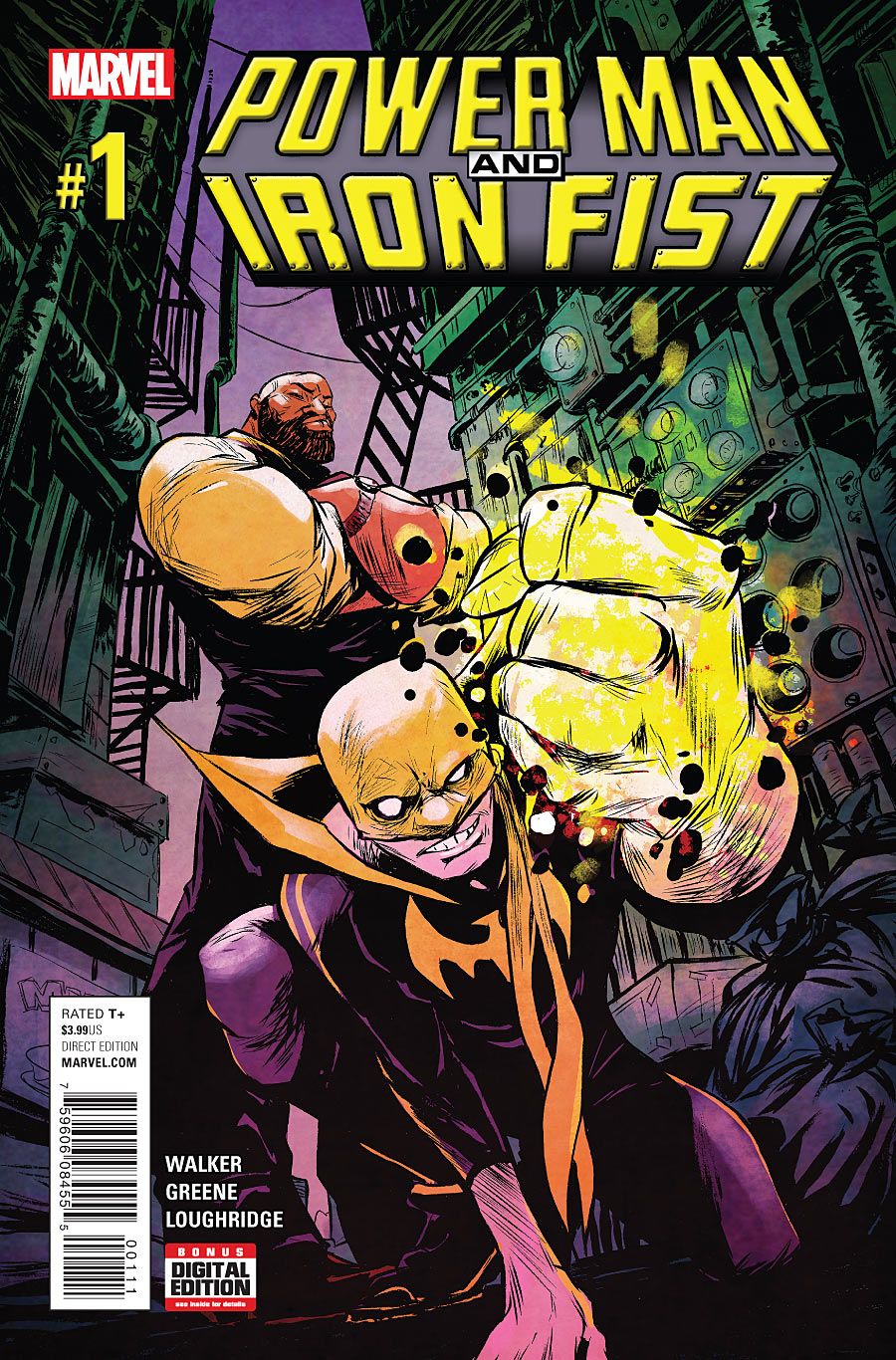Luke Cage and Danny Rand are two complex characters capable of handling a range of stories. They can be fun, emotional or just plain dangerous. Jo Duffy knew this in the '80s, when they last headlined a book. Influenced by her lighter tone, David Walker and Sanford Greene embrace it all in "Power Man and Iron Fist" #1. It's entertaining. It's thoughtful. It's stylish. It has a voice and a vision.
Walker Explores Luke Cage's Evolution, Ties that Bind in "Power Man & Iron Fist"
This is a buddy comedy. We may get some intensity later, but Walker needs to disarm and charm us first, and he does so with tonigue-in-cheek caption boxes and descriptors. Jessica tells Luke she better not see any tiara pics if he's working with Danny. Luke needs to curb the fiddle-faddling swears.
Walker utilizes page turns as a way to underline the themes of his story, like family and trust. However, he doesn't sacrifice character for jokes. Danny is still a carefree billionaire, nostalgic for the past. Luke is still a capable family man trying his best to communicate with words rather than fists. Like pieces of a puzzle, they click instantly.
The dialogue rhythm lets the story flow across the pages. Walker's Danny is entertaining without being annoying. His Luke is measured and confident. Lonnie Lincoln, aka Tombstone, is powerful but insecure. It's hard work that Walker handles with ease.
The downfall of many comedy books is that they wind up being a series of moments that don't add up to a whole. "Power Man and Iron Fist" #1, however, feels whole. Comedy gets out of the way when the action ramps up. I was reminded of "Quantum and Woody" while reading this, which was written by the brilliant Christopher Priest, who penned the end of this duo's first volume. Sometimes comics' self immolation is a good thing.
Greene's characters are all unique with personal style. They emote and react in that way only comics can convey. Old Marvel style dictated that the artist discover the most impactful moment of a beat and blow it out. Greene does that even in the quiet scenes. There really isn't a boring panel in the comic book. The backgrounds of The Excelsior Diner are littered with little jokes, like a series of Stan Lee headshots and an autographed poster from Duffy. All the while, Greene doesn't sacrifice substance for style; if you cover up the dialogue boxes on each page and look at the characters facial reactions and clothing, you still know who they are.
Greene experiments with extreme panel angles and stylized designs. Luke looks like he's really amped up after his last workout. Rand comes across like a water spirit, able to strike at a moment's notice, his relaxation mistaken for weakness. Tombstone hasn't looked this cool since his debut in "Spectacular Spider-Man."
Our first villain arrives with a last page reveal that will excite old fans. Greene's low angle shot lets new readers know that -- like the Wu-Tang Clan -- she is nuttin' ta fiddle faddle wit'. He's really coming in to his own here.
Here's my gripe: "Power Man and Iron Fist" sounds like a Vivid video series. Why is this book not called "Luke Cage and Iron Fist?" Casual fans know Luke Cage from the "Jessica Jones" Netflix series. At best, Power Man sounds like a guy that will climb up the utility pole and fix your cable hookup so you don't miss the new episode of "The Bachelor."
This is a fun, funny book that takes itself just seriously enough. Ultimately, that's what I want out of a comic like this. I didn't come to this book looking for a furrow-browed rumination on politics or a bicep flexing contest. If that's what you're seeking, there are plenty of iterations of the characters available in the Marvel Universe to satisfy that need.
Walker tells a compelling story that utilizes the past to create a new narrative. He doesn't have to reinvent the wheel here; he has all the toys in the toybox already. It's fiddle-faddling awesome.
The band is back together. Nobody tell Luke.

